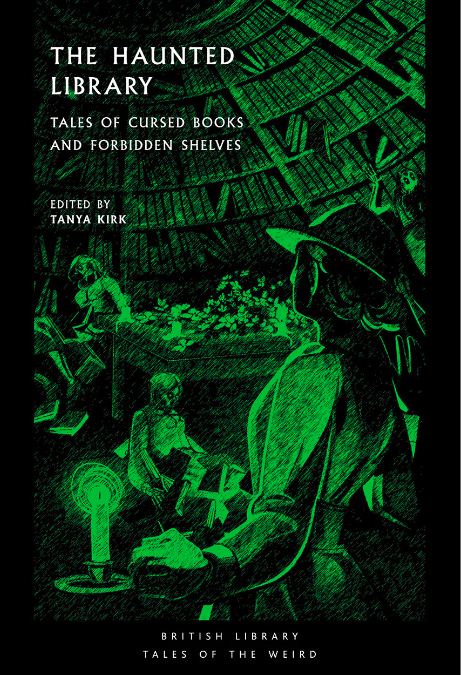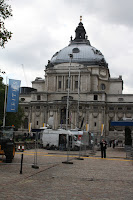(The picture is just to show Fr Ray that Methodist Central Hall (sort of) decked itself out for the Pope, as well as The Albert on Victoria St.)This posting is about England and Wales, even though it might ring true in some other jurisdictions as well.
We've had priest-blogger equivalents for many years: they write in parish newsletters or the local press; some have columns in the Catholic press, or appear on Thought for the Day. A reasonable proportion prepare homilies which they deliver each Sunday; a lot of others extemporise. But we are used to hearing views from the clergy about major issues of the day, the third world, international debt, how wonderful CAFOD is, and sometimes God. The blogosphere has allowed the more readable clergy and religious to put their offerings before a much wider and international audience, and they are flourishing, offering a distinctive voice in the Church.
But for many years, the only lay bloggers (using the same analogy) were those writing in the Catholic press. It would be fair to say that the quality of the Catholic press is mixed, in the same way that the gourmet value of most High Street eateries is mixed. Much of it is dire, but there is the odd jewel (I think, for example, of Stuart Reid) at times, and for some people, it is the only source of intellectual nourishment about the faith (as well as an opportunity to see wha the Press Officers of now-independent Catholic Grammar Schools can boast about).
(The letters page wasn't really an analogue, because somebody else: the editor: has total control of it. The blogosphere obeys the market: if your blog is valueless, nobody will come. The Catholic letter page is a command economy: how else would Tom from Somerset ever find any readers?)
So now that there is an alternative, who are the lay Catholic Bloggers, and where are they? While you read what follows, bear two quotes in mind:
The Pope quoted Newman:
“I want a laity, not arrogant, not rash in speech, not disputatious, but men who know their religion, who enter into it, who know just where they stand, who know what they hold and what they do not, who know their creed so well that they can give an account of it, who know so much of history that they can defend it.”
and Fr Ray, when I asked for leadership from the Hierarchy said:
“Yes, yes, yes but it will only happen only with the help of a well educated laity who make these demands of all the clergy.”
Now, before I continue I want to make one thing very clear: I am not an Oratorian, and, in particular, I am not a member of the Birmingham Oratory. That means that I don't know what has gone on inside the Oratory. Something has, because the Oratory received a Visitation, and the Visitor has made some judgements about what happened.
That's all I know.
And that, I suggest tentatively, is all that anybody outside the Oratorian Congregation can possibly know. But this post is about the Catholic laity who use their voices.
The squaring up of various Catholics in respect of the "Birmingham Three" is actually about something else (which must be a bit of a downer, if you are a Birmingham Oratorian, but hey ho). It's about lay people deciding that it is up to them themselves where the voice of the Catholic laity can be heard and where it should be heard, and it's about who identifies both the Catholic laity who have voices, and the voices which belong to the Catholic laity.
This is an extraordinary and ironic fruit of the "Spirit of Vatican II": the lay people it "empowered" to throw off clericalism and speak as equal members of God's Church have done so, but many are so off-message that they are threatening to upset the equilibrium that the S of V II appeared to have imposed on the Catholic Church here.
There are five different strands of commentary which are fairly easy to identify (please don't get hung up on the labels - that's all they are):
The Tabletistas: those in favour of the anti-Benedictine pro-"Spirit of Vatican II" status quo; the people who in the main hold the levers of power; people who sneer at the Pope and those who accept his theology and ecclesiology; its loony fringe is liberal Anglicanism;
The NeoCons: JPII Catholics; often articulate spokesmen often from the new movements; sometimes converts from Anglicanism; vigorous; orthodox insofar as they have ever come across the orthodox teachings of the Church, but sometimes a bit over-confident in the way in which they articulate what they believe that Catholic believe;
The Neither of the Above: JPII Catholics, articulate spokesmen who are neither of the above. At a major disadvantage because they don't belong to a group which nourishes and supports them.
The Trads: sometimes articulate, sometimes "differently choate" spokesmen for a pre-JP II view of Catholicsm. At an even greater disadvantage because they don't belong to a group and the first two groups are firing missiles at the place where they would try to form a group if they could. People gather around the leading trad bloggers but these people can be ignored online as lay Catholics are ignored in the real world by the powerful. Its loony fringe comes from the traddier-than-thou tendency (we'll have an SSSG soon which will recreate the Liturgy of the 6th Century and it will immediately force the formation of a counter-group which despises St Gregory for his actions in rewriting the Roman Mass);
and, on his own:
Damian Thompson: unwilling to lead the faction which would follow him (and who could blame him, knowing what he'd have following him, as well as what he'd have opposing him). The Boris Johnson of English and Welsh Catholicsm (mutatis mutandis of course).
Catholic Voices could have been an interesting way of bringing together the non-Tabletista tendencies and to have created a powerful force in the Church, one which might have been able to achieve what the Pope and Fr Ray asked for. We might have had a sort of Catholic Evidence Guild which preached the Truth inside the Church as well as outside it. The way the idea was emasculated, the way in which the Birmingham Oratory became a battlefield for something else, will be familiar to anybody with experience of student politics. But might it also be a case that "they" are beginning to run scared?
What next?
.
















































4 comments:
Interesting.
Much to think about, but I'm afraid I can never see Damian Thompson in quite the heroic light with which you paint him. He can spread rumour, he can be flippant, he allows a level of nastiness amongst his followers that always has me feeling that his blog does nothing more than leave the Catholic Church looking like an organisation of pettyminded, self-absorbed, well fed, over-educated sad gits who should get out more.
TTony I've got the feeling your post is missing something- but whether it's something you'd rather not say or what I know not.Perhaps Im just too out of touch with 2010 E&W.
I suspect Newman's dictum is not just for the most public of public squares, but also all one's daily encounters - in which well I know the my own sins will catch me out - and that I do less badly - well is too fine - with prayer, regular sacraments, mor open to God's grace.
And golly - it's humanly very encouraging to have a gungho Bishop or so about.
I'm very much with Rita on Thompson. I have always found his blog disedifying in the extreme - bitchy, partisan, crude, jejune and merely a mirror-image of liberalism in its preoccupation with institutions, power and personality.
Liberals think Catholicism is whatever the progressive majority considers most inclusive. Conservatives think Catholicism is whatever the present Pope says it is. Self-identified "Traditionalists" might be anywhere on a vast spectrum of incompatible, mutually contradictory positions, from uber-scholastic ultramontane to crypto-Orthodox.
I really appreciate your post and you explain each and every point very well.Thanks for sharing this information.And I’ll love to read your next post too
Post a Comment